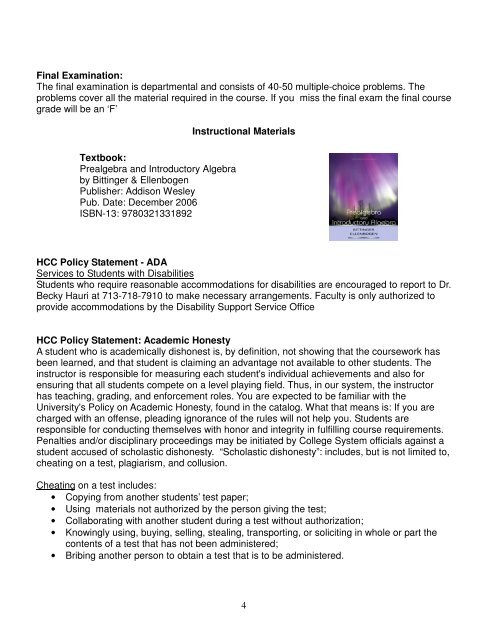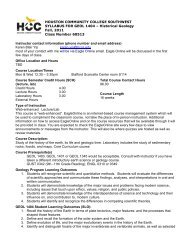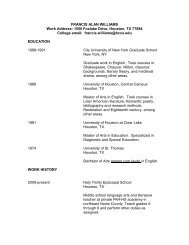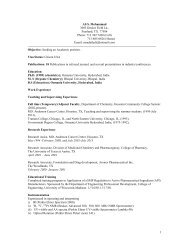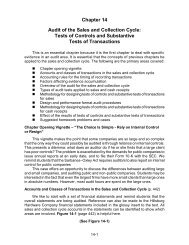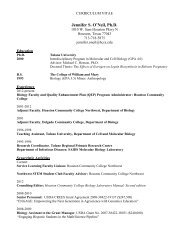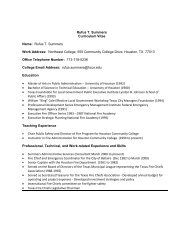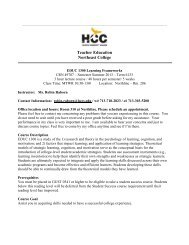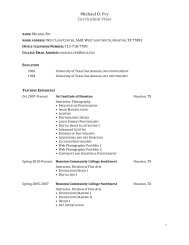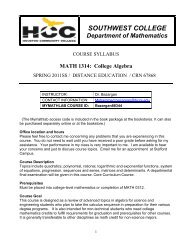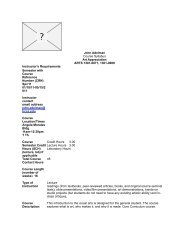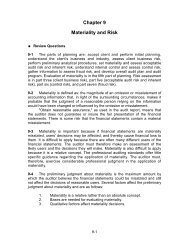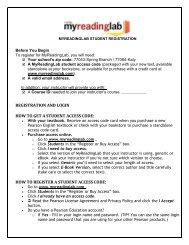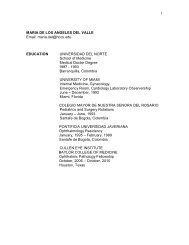Final Examination:The final examination is departmental and consists of 40-50 multiple-choice problems. Theproblems cover all the material required in the course. If you miss the final exam the final coursegrade will be an ‘F’Textbook:Prealgebra and Introductory Algebraby Bittinger & EllenbogenPublisher: Addison WesleyPub. Date: December 2006ISBN-13: 9780321331892Instructional Materials<strong>HCC</strong> Policy Statement - ADAServices to Students with DisabilitiesStudents who require reasonable accommodations for disabilities are encouraged to report to Dr.Becky Hauri at 713-718-7910 to make necessary arrangements. Faculty is only authorized toprovide accommodations by the Disability Support Service Office<strong>HCC</strong> Policy Statement: Academic HonestyA student who is academically dishonest is, by definition, not showing that the coursework hasbeen learned, and that student is claiming an advantage not available to other students. Theinstructor is responsible for measuring each student's individual achievements and also forensuring that all students compete on a level playing field. Thus, in our system, the instructorhas teaching, grading, and enforcement roles. You are expected to be familiar with theUniversity's Policy on Academic Honesty, found in the catalog. What that means is: If you arecharged with an offense, pleading ignorance of the rules will not help you. Students areresponsible for conducting themselves with honor and integrity in fulfilling course requirements.Penalties and/or disciplinary proceedings may be initiated by College System officials against astudent accused of scholastic dishonesty. “Scholastic dishonesty”: includes, but is not limited to,cheating on a test, plagiarism, and collusion.Cheating on a test includes:• Copying from another students’ test paper;• Using materials not authorized by the person giving the test;• Collaborating with another student during a test without authorization;• Knowingly using, buying, selling, stealing, transporting, or soliciting in whole or part thecontents of a test that has not been administered;• Bribing another person to obtain a test that is to be administered.4
Plagiarism means the appropriation of another’s work and the unacknowledged incorporation ofthat work in one’s own written work offered for credit.Collusion mean the unauthorized collaboration with another person in preparing written workoffered for credit. Possible punishments for academic dishonesty may include a grade of 0 or Fin the particular assignment, failure in the course, and/or recommendation for probation ordismissal from the College System. (See the Student Handbook)<strong>HCC</strong> Policy StatementsClass Attendance - It is important that you come to class! Attending class regularly is the bestway to succeed in this class. Research has shown that the single most important factor instudent success is attendance. Simply put, going to class greatly increases your ability tosucceed. You are expected to attend all lecture and labs regularly. You are responsible formaterials covered during your absences. Class attendance is checked daily. Although it is yourresponsibility to drop a course for nonattendance, the instructor has the authority to drop you forexcessive absences.If you are not attending class, you are not learning the information. As the information that isdiscussed in class is important for your career, students may be dropped from a course afteraccumulating absences in excess of six (6) hours of instruction. The six hours of class timewould include any total classes missed or for excessive tardiness or leaving class early.You may decide NOT to come to class for whatever reason. As an adult making the decision notto attend, you do not have to notify the instructor prior to missing a class. However, if thishappens too many times, you may suddenly find that you have “lost” the class.Poor attendance records tend to correlate with poor grades. If you miss any class, including thefirst week, you are responsible for all material missed. It is a good idea to find a friend or a buddyin class who would be willing to share class notes or discussion or be able to hand in paper ifyou unavoidably miss a class. Class attendance equals class success.<strong>HCC</strong> Course Withdrawal PolicyIf you feel that you cannot complete this course, you will need to withdraw from the course priorto the final date of withdrawal. Before, you withdraw from your course; please take the time tomeet with the instructor to discuss why you feel it is necessary to do so. The instructor may beable to provide you with suggestions that would enable you to complete the course. Yoursuccess is very important. Beginning in fall 2007, the Texas Legislature passed a law limitingfirst time entering freshmen to no more than SIX total course withdrawals throughout theireducational career in obtaining a certificate and/or degree.To help students avoid having to drop/withdraw from any class, <strong>HCC</strong> has instituted an Early Alertprocess by which your professor may “alert” you and <strong>HCC</strong> counselors that you might fail a classbecause of excessive absences and/or poor academic performance. It is your responsibility tovisit with your professor or a counselor to learn about what, if any, <strong>HCC</strong> interventions might beavailable to assist you – online tutoring, child care, financial aid, job placement, etc. – to stay inclass and improve your academic performance.5


